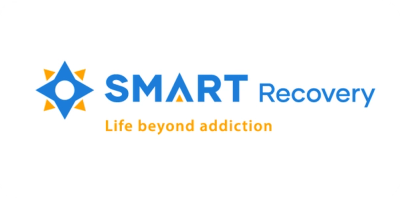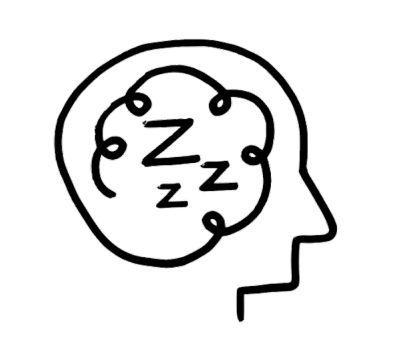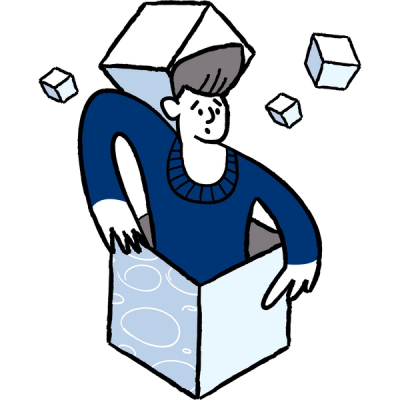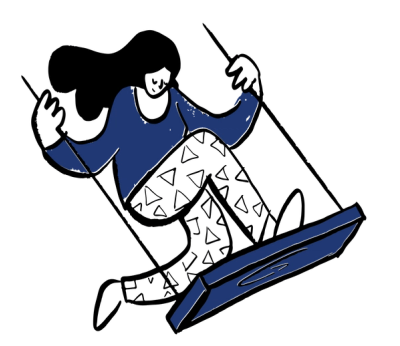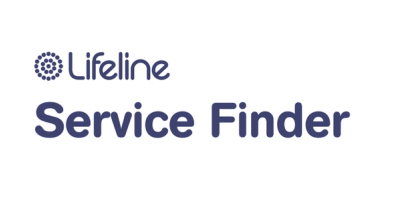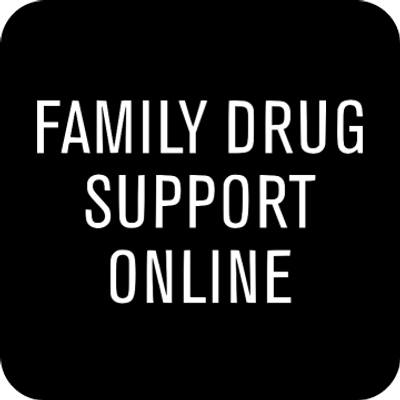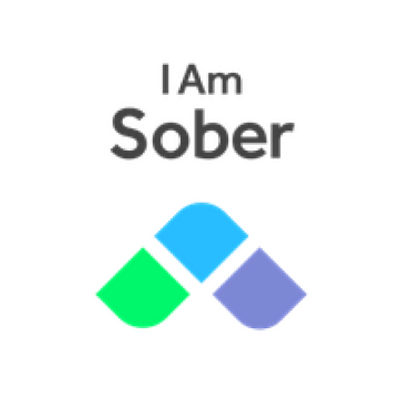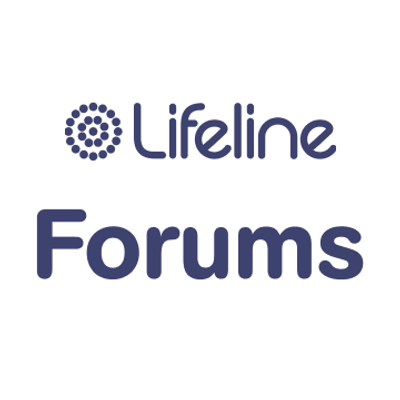What is addiction?
Addiction happens when our brain relies on certain substances or behaviours to feel good or to deal with stress, pain, and difficult emotions. Unlike daily habits that help us cope in healthy ways (like having a coffee or going for a walk), addiction can make certain habits feel impossible to stop - even when they’re causing harm to ourselves or those around us.
While it’s common to think of addiction in terms of things like alcohol or smoking, it can be a complex journey that shows up in other ways too. For example, exercising, gaming, and even spending time at work can become addictive.
If you or someone you care about is struggling with addiction, you’re not alone. Between the rising cost of living, current events happening around the world, and the emotional pain that mental health challenges can bring, it’s easy to turn to substances or behaviours to cope or to feel a sense of control.
- Types of addiction
- Alcohol and other substances
- Nicotine (cigarettes and vapes)
- Eating disorders
- Exercise
- Gambling
- Pornography
- Self-harm
- Sex
- Shopping
- Tech (Gaming, Internet, and social media)
- Work.
Keep in mind that this is not an exhaustive list.
The idea of stopping certain behaviours might feel overwhelming, but it’s important to remember that overcoming addiction is possible. With the right support and resources, you can absolutely develop healthier coping mechanisms and move towards a happier future.
In this guide, you’ll find information on:
- How addiction works in the brain
- Recognising addiction in yourself and others
- Strategies for managing cravings and urges
- Tips for managing addiction in the long term.
Scroll down to learn more.
How addiction works
Addiction often starts with a trigger. This could be something outside of you, like stress from work or a fight with a partner, or something inside, like feeling anxious, lonely, or overwhelmed.
- Emotional or physical pain: These triggers cause emotional or physical pain, making you feel uncomfortable or upset
- Cravings and urges: To escape this pain, you begin to crave something that will make you feel better, whether it’s a substance (like alcohol) or a behaviour (like gambling or overeating)
- Coping with substances or behaviours: You turn to the substance or behaviour to cope, and it gives you some temporary relief
- Temporary relief: For a moment, the pain goes away. But soon enough, the relief fades, and you start needing more of the substance or behaviour to feel the same effect.
- Tolerance and dependence: Over time, your brain and body start relying on these behaviours or substances, and it becomes harder to stop.
Sometimes, patterns develop that make it feel like you’re stuck in a cycle. Recognising these patterns is the first step to finding ways out.

When you recognise and address your addiction in healthy ways, it can be a turning point, helping you reflect on what’s out of balance and opening the door to healing.
For example, addiction might be telling you that you’re:
- Trying to avoid difficult emotions
- Feeling disconnected from others or yourself
- Struggling with overwhelming stress or trauma.
Awareness is the first and most important step when it comes to healing. So even just questioning if certain things you’re using or doing are a form of addiction is something to be really proud of.
Below, you can learn about some of the things you can look out for when trying to recognise addiction in yourself or others.
Recognising addiction
Recognising addiction can be difficult, especially when it develops gradually. One way to start is to understand the difference between a habit and an addiction.
A habit is something you do regularly and can stop if you choose to, like brushing your teeth or biting your nails. Addiction is something you feel like you have to do, even if it’s harmful. Stopping can feel much harder than breaking a habit.
Here are a few signs that you might be struggling with addiction:
- Frequent mood swings dependent on access to the addictive substance or behaviour
- Feeling irritable, anxious, or depressed
- Withdrawing from work, school, or family commitments
- Acting impulsively, like taking risks or making decisions without thinking about the consequences
- Losing interest in activities you used to enjoy
- Changes in sleep patterns or appetite
- Spending more time, energy, and money on the addictive behaviour or substance.
It’s important to remember that these things don’t always happen all at once. Sometimes, they’re subtle, and it can be easy to dismiss them.
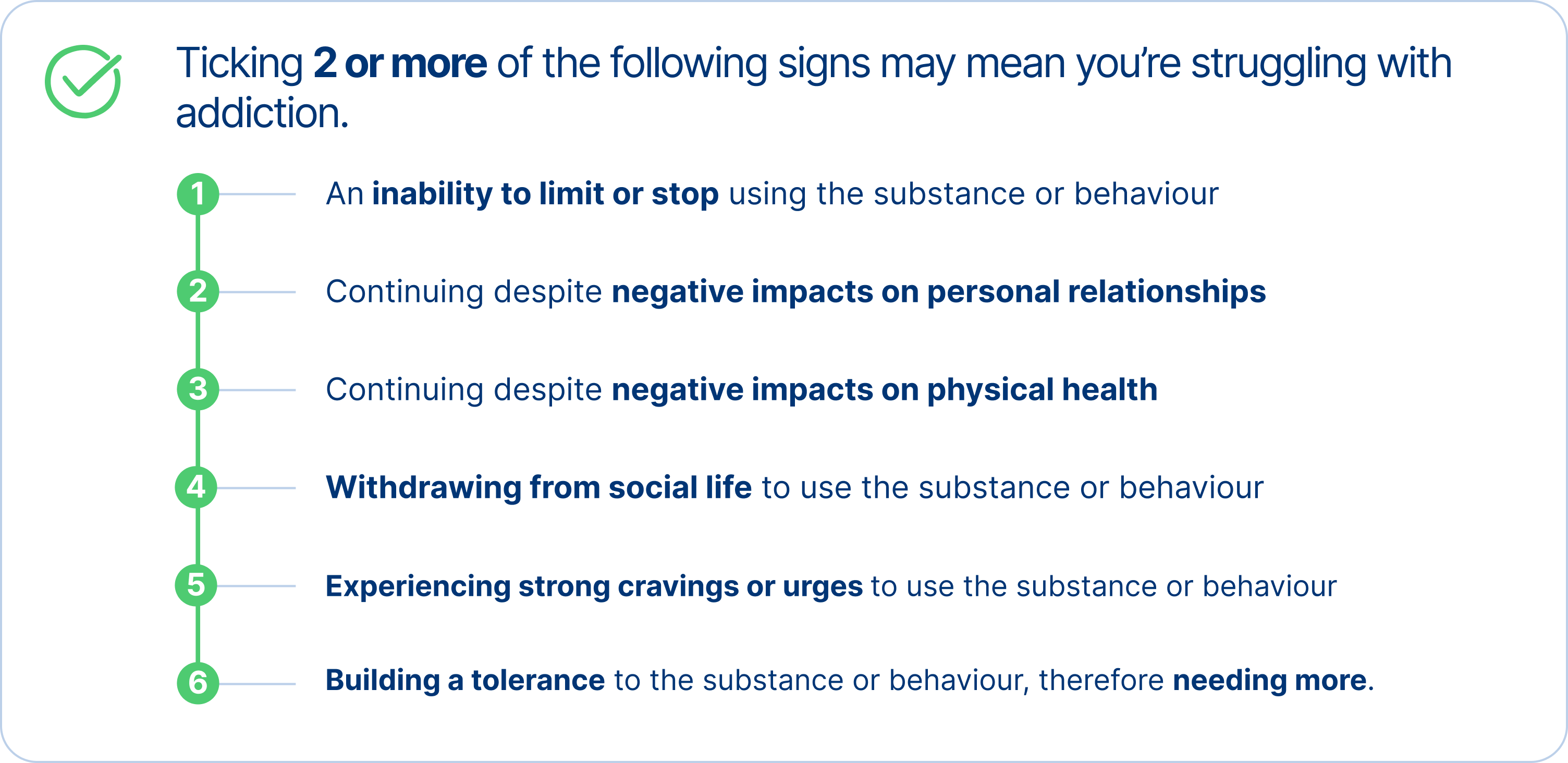
If you’re seeing these signs in yourself or someone close to you, it’s okay to ask for help. Addiction is something a lot of people struggle with and there are a number of support options available.
“I kept telling myself I was in control, but deep down, I knew something wasn’t right. I’d cancel plans, skip work, and my mood was all over the place. That’s when I knew I wasn’t just having a bad week, I was struggling with something bigger.”
Stopping use of substances suddenly can feel uncomfortable and might even be unsafe for some people.
It’s important to talk to an Alcohol or Other Drug (AOD) professional or a GP before you make any sudden changes to your drug or alcohol use.
Breaking an addiction can leave you feeling overwhelmed, distressed, and alone. If you need someone to talk to, Lifeline crisis supporters are here for you 24 hours a day, 7 days a week via 13 11 14, text, and chat. If life is in danger, call 000.
You can learn more about support options for substance misuse by clicking here.
Accepting addiction
It can be tough to accept having an addiction for a lot of reasons.
- Fear of judgement: Admitting you’re struggling can feel like opening yourself up to criticism or judgement from others
- Stigma: Addiction is still misunderstood by many, and you may fear being labelled as ‘weak’ or ‘out of control’
- Denial: It’s tempting to convince yourself that you’re managing fine, even when the signs of addiction are clear. Denial is something we do to cope in the short term, but it’s not helpful in the long run.
- Shame and guilt: Feeling ashamed about your behaviour can make it hard to speak up or accept help. You might feel guilty about how your actions have affected others.
Recognising these challenges is important, but reaching out for support is a big step toward healing and a true sign of strength. Many people have been where you are, asked for help, and made it through. You deserve to feel healthy, supported, and at your best.
Short-term management
Facing addiction can feel tough, especially when cravings or urges pop up. By trying out new ways to cope and asking for support, you can start to feel more in control and make changes that feel right for you.
In this section, you’ll find techniques, tools, and resources that can help you build confidence and take steps toward recovery. Remember, everyone’s journey with addiction is different, so what works for someone else might not work for you, and that’s okay. The key is to keep trying until you find what helps you most.
Understanding how your addiction shows up
Addiction and mental health are closely linked. Often, addictive behaviours are ways to cope with deeper emotional struggles like stress, anxiety, loneliness, sadness, guilt, or anger. And on the flip side, addiction can lead to mental health challenges.
By thinking about what’s causing any underlying emotional pain, you can begin to address the root causes of your addiction.

Below, you can find tips and ideas for managing your addiction.
- Journal your thoughts and feelings
Writing down your thoughts can help you identify patterns and triggers and how your mental health might be influencing your addictive behaviours.
Try asking yourself:
- ‘What situations or emotions trigger my cravings or urges?’
- ‘How do I feel before, during, and after engaging in addictive behaviour?’
- ‘Are there underlying emotions, like anxiety or stress, that I’m trying to cope with through this behaviour?’
- ‘Who can I talk to about my struggles, and how would I begin that conversation?’
Click here to learn more about journaling your thoughts and feelings.
- Talk to someone you trust
- Explore self-assessment quizzes
Coping strategies for managing cravings and triggers
What can I try now?
If you're feeling strong urges or are in a situation that triggers your addiction, a grounding technique like box breathing can help calm your mind and body, giving you a sense of control within minutes.
If you’d like to try box breathing now, click play on the video below.
It can feel difficult to resist, but the more you practise, the easier it will become to manage urges and stay on track. You can think about it like building a muscle. With time and repetition, you’ll get stronger and stronger.
Scroll down to read more strategies you can turn to when cravings occur.
- Pause and take a break
If you’re in a situation you feel might lead you towards your addictive behaviour, creating space can give you time to reflect and choose a different path.
You can:
- Go for a walk
- Move to a quiet space
- Take a few deep breaths to regain control.
It’s okay if you need to avoid certain situations for a period of time.
- Release physical tension
- Try mindfulness and meditation
- Use grounding techniques
- Redirect your focus
- Challenge your thoughts
- Express your feelings in healthy ways
- Seek professional and peer support
Remember, recovery is a journey. It takes time, patience, and the support of others, but every step you take is progress. With the right strategies and resources, you can build a healthier future for yourself.
Scroll down to learn about managing addiction in the long term.
Long-term management
- Stay connected to supportive people
The people and environments around you play a big role in your recovery. Whether it’s friends, family, or a support group, having people you can lean on when things get tough is key to staying on track.
If you don't feel like you have a good support circle right now or you're trying to break away from a group that doesn't bring out the best in you, you may want to read our article about building strong social connections here.
- Set up time and space for self-care
- Build a healthy lifestyle and maintain routines
- Use online programs and apps to stay accountable
Planning for future challenges
Planning for future challenges is a key part of long-term recovery because it can help you stay strong when difficult emotions or overwhelming situations arise.
Creating a personalised trigger management plan that outlines how you’ll identify and handle triggers can help you feel more confident and in control.
Your plan might include:
- Identifying triggers: Make a list of people, places, or situations that might tempt you to return to addictive behaviours. Knowing your triggers ahead of time can help you avoid or manage them when they arise.
- Creating coping strategies: Decide on specific actions you’ll take if you encounter a trigger. This might include calling a friend, practising mindfulness, or stepping outside for a walk to clear your mind.
- Building a support network: Identify trusted friends, family, or professionals you can reach out to when you need encouragement. Having someone to talk to during tough moments can make all the difference.

Keep in mind that setbacks happen and it’s okay to restart your journey at any point. Overcoming addiction is incredibly tough and it’s not an all-or-nothing thing.
Continue reading for more ideas.
- Learn more about addiction
Learning more about addiction can help you make sense of what you’re going through and guide you towards recovery.
Here are some helpful resources:
- Support Toolkit resources: Our Support Toolkit also includes detailed guides on related behaviours like gambling, substance misuse, and self-harm.
- Addiction-specific websites: Explore reputable websites like Turning Point for evidence-based information and articles on addiction and mental health.
- Books:
- In the Realm of Hungry Ghosts by Dr. Gabor Maté: Focuses on understanding addiction through a compassionate lens, exploring the link between trauma and addictive behaviours.
- The Recovery Book by Al J. Mooney: A comprehensive guide that walks readers through the steps of recovery, providing practical advice and tips.
- Overcoming Addiction by Deepak Chopra: Offers a holistic approach to addiction recovery, focusing on mind-body healing and resilience.
Not sure where to get these books? You can visit your local library. Click here to find yours.
- Find inspiration from others
- Handle setbacks with self-compassion
- Stay connected to your support
Recovery is an ongoing process, and it’s one that requires patience, perseverance, and self-compassion. It’s important that you’re being kind and patient with yourself as you continue moving forward towards a brighter, happier, and healthier future.
“When I relapsed after a year of sobriety, I thought I’d lost everything. But I learned that recovery isn’t about being perfect; it’s about resilience. Now, three years later, I’m stronger and more committed to my wellbeing than ever.”
Remember, each day is an opportunity for growth and recovery and there are always people who want to help. Everyone deserves to feel good, including you.
Support services
Below, you can find support services that offer addiction information, counselling, and referrals to local services in your area.
Looking for help with quitting smoking or vaping?
Quitline counsellors provide friendly, supportive counselling to help you understand the harms of smoking or vaping and the benefits of quitting.
Available 24/7 via 137 848, they can guide you through various quitting methods and offer helpful tips to manage cravings in a welcoming and non-judgmental manner.
Click here to visit the Quitline website for more contact options.
Can't find what you're looking for? Use the Lifeline Service Finder to search for more local and national services that are available to help support you.
Tools and apps
Below, you’ll find tools like online learning programs, forums, wellbeing apps, and podcast episodes that can help you manage addiction right now and in the long term.




